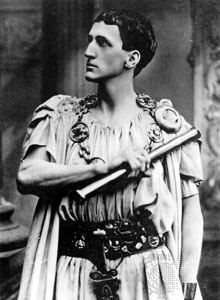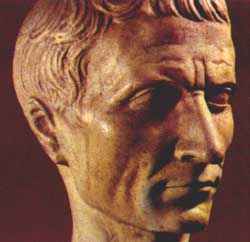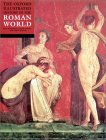Ceasar's youth
When Caius Julius Caesar was born, the leading man in Rome was Caius Marius, who had saved the Roman Republic several years before by defeating two German tribes, the Teutones (102) and the Cimbri (101). The connections between the Marius and Julius families were close: Marius was married to a sister of Caesar's father. So, Caesar belonged to a powerful family.
His contemporaries called Marius a popularis. It is unclear what this label means (for some speculations, see below), but modern historians tend to believe that it means that Marius tried to reach his political aims via the People's Assembly. The opposite group, the optimates, played the political game in the senate.
When Caesar was still an infant, Marius lost much of his earlier popularity, and eventually left Rome to travel in Greece and Asia Minor, hoping for some new command. However, Marius was still influential, and in 92, Caesar's father was elected praetor (a magistrate whose most important function was the administration of justice). In 91, the former praetor served as a governor in Asia Minor; it is likely, therefore, that the young Caesar was outside Italy when the Social War started.
 This war originated in the fact that the Roman allies in Italy had never received a fair share in the spoils of the Roman empire, which included in those days Andalusia, southern Castile, Catalonia, the Provence, Italy, the Dalmatian coast, Greece and Macedonia, Asia Minor, Cyprus, Crete and modern Tunisia. The Italians had fought to conquer the Mediterranean world, but did not get the benefits of it. In 91, they rebelled. Marius was appointed general and had some success; more important, however, were the victories of Sulla, a man who was considered to be one of the optimates. By diplomatic ways, Rome divided the rebels: Lucius Julius Caesar (an uncle) promised Roman citizenship to those Italians who had remained faithful, and in 89 a similar law promised citizenship to those who gave up fighting.
This war originated in the fact that the Roman allies in Italy had never received a fair share in the spoils of the Roman empire, which included in those days Andalusia, southern Castile, Catalonia, the Provence, Italy, the Dalmatian coast, Greece and Macedonia, Asia Minor, Cyprus, Crete and modern Tunisia. The Italians had fought to conquer the Mediterranean world, but did not get the benefits of it. In 91, they rebelled. Marius was appointed general and had some success; more important, however, were the victories of Sulla, a man who was considered to be one of the optimates. By diplomatic ways, Rome divided the rebels: Lucius Julius Caesar (an uncle) promised Roman citizenship to those Italians who had remained faithful, and in 89 a similar law promised citizenship to those who gave up fighting.
Seizing the opportunity, king Mithridates V of Pontus attacked Asia Minor. The inhabitants of this province had welcomed their liberators, and had murdered many Italians and Romans. It is unknown where Caesar's family was in those days: it is certain that Caesar's father was no longer Asia's governor. The Romans wanted revenge, and the Senate appointed Sulla as a general in this First Mithridatic War. After his departure, Marius was given the same command by the People's Assembly. Sulla marched on Rome (First Civil War), Marius fled to Africa, and Sulla went to Asia Minor again, where he defeated Mithridates. During Sulla's absence, Marius returned, massacred all his enemies, had himself elected consul (86), but died a few days later.
From now on, Caesar's life was in danger: after all, he was the son of Marius's sister. His safety did not grow when his father died (85) and the victorious Sulla returned from Asia (82). However, the young man had had a fine education by one of Rome's most important professors, Marcus Antonius Gnipho, who was also the teacher of the orator Cicero. Caesar was married to Cornelia and had a daughter, Julia.
After his return, Sulla had himself appointed dictator. Originally, dictatorship was an extraordinary magistracy, perhaps best translated as "strong man", and "dictatorship" had nothing to do with tyranny. However, Sulla's exercise of the office gave rise to our present meaning of the word: wishing to exterminate the populares, Sulla changed the constitution by curtailing the rights of the People's Assembly. Many people were slain: Marius's ashes were scattered in the Tiber. Since Caesar was only eighteen years old, Sulla decided to be kind, and ordered Marius' nephew to divorce from his wife, as a symbolic act of his loyalty to the new regime. Although the alternative was banishment (or worse), Caesar refused. Sulla appreciated the young man's dedication to his bride, pardoned him, and prophesied that "in this young man there is more than one Marius".

Roman chronology is basically the foundation of the entire edifice of global chronology. An imaginary foundation!
Despite its numerous gaps and inconsistencies, Roman history is the best-documented field of ancient history, and thus a reference scale of a paramount importance. But how well do we know the actual date of the city's foundation? The question makes more sense than it might seem to originally for several reasons.
Firstly, Rome is supposed to have been founded by the Trojans who had to flee after the fall of Troy. However, there are lots of different opinions as to when that happened exactly, and the datings offered are scattered over the range of five hundred years. Some claim Rome to have been founded by Aeneas and Ulysses shortly after Troy had fallen; others are of the opinion that there was an entire dynasty that ruled for 400 years between the fall of Troy and the foundation of Rome.
What do modern historians really say about the correct chronology of the Ancient Rome when they do not have to produce textbook-friendly output? The following: "Neither Diodorus nor Livy possess a correct chronology . . . we cannot trust the fasti, which tell us nothing about who was made consul in which year, or the cloth writings that led Licinius Marcus and Tubero to contradictory conclusions. The most trustworthy documentation is the kind that turns out to be much more recent forgeries after in-depth analysis".
This book will change your perception of History forever!
What if Ancient Rome, Greece and Egypt were invented during Renaissance?
What if The Old Testament was a rendition of events of the Middle Ages?
What if Jesus Christ was born in 1053 and crucified in 1086 AD?
Sounds Unbelievable?
Not after you've read "History: Fiction or Science?” by Anatoly Fomenko, the leading mathematician of our time.
|






 View movies about ancient Rome!
View movies about ancient Rome! 
